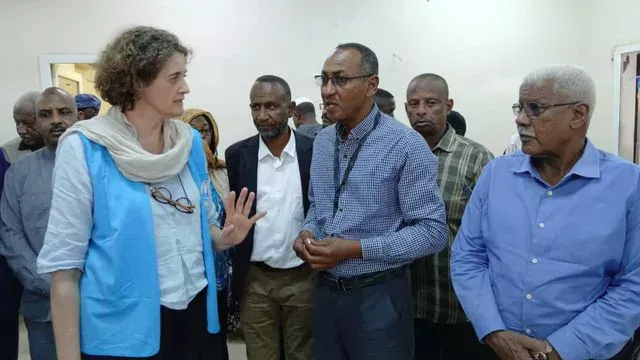She visited Nou Hospital and the hot zones of Khartoum. The Ministry of Health receives the United Nations High Commissioner for Refugees and informs it of the situation of medical institutions facing the war.

Today, the Khartoum State Ministry of Health received the United Nations High Commissioner for Refugees, Christina Hambo, and briefed her on the health situation and the services provided by the ministry through ( 23) hospitals operating in safe areas and (124) health centers, during the visit recorded by the commissioner and the accompanying delegation to Al-Naw Education Hospital and her tour of all working departments, and Meanwhile, the general director of the hospital, Dr. Jamal Al-Tayeb is the most important requirement on his desk, namely that the hospital needs an oxygen plant, a scanner and solar energy to produce electrical energy, after explaining to him the high frequency of patients and wounded in the hospital since the start of the war.
The United Nations High Commissioner for Refugees observed the extent of the destruction that hit the Tropical Zones Hospital and documented it with his personal phone camera in the presence of Dr. Ahmed Fadlallah Al-Bashir, Director of the General Administration of Preventive Medicine and Director of the General Administration of Organizations and Partnerships, Dr. Hisham Abdullah and Dr. Al-Sadiq Suleiman Yacoub, Deputy Commissioner for Refugees in Khartoum State and States from the North.
Dr Ahmed Al-Bashir explained to the High Commissioner that the Tropical Zone Hospital, which is the main referral hospital for endemic tropical diseases in Sudan, was used by rebel militias as a military site and, when they left it, they completely destroyed the hospital and all existing equipment, which makes its return to service one of the requirements of the Ministry of Health at this stage, he stressed. To increase the safe geographical area, it is necessary to rehabilitate hospitals destroyed by war, emphasizing that the hospital was destroyed by war. that the provision of medical services contributes significantly to the return of citizens to their regions.






